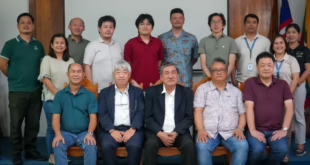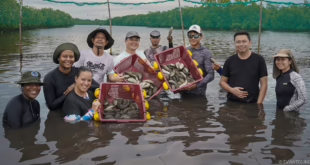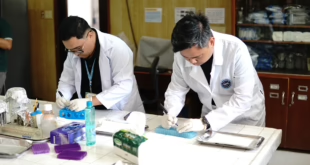By Development Communication Section
The 2013 Asian-Pacific Aquaculture conference organized by the World Aquaculture Society was held in Ho Chi Minh City, Vietnam from 10 to 13 December. AQD scientist Dr. Eleanor Tendencia and senior technical assistant Mr. Eliseo Coniza were among the oral presenters.
Dr. Tendencia talked about her study “Management strategies employed by small-scale shrimp farmers in the Philippines in coping with economic crises due to shrimp diseases.” Her study shows that majority of the small-scale shrimp farmer respondents reverted to milkfish monoculture or polyculture of shrimp with milkfish, tilapia or crab. The farmers who are still into shrimp farming stock their shrimps in net enclosures for 2-3 weeks before releasing into the rearing pond to increase survival. To lower rearing cost, most farmers rely on naturally grown food such as lumut and lablab as shrimp feed. Alternatively, to save on production cost, some farmers practice feeding shrimp with commercial pellets on the first month only instead of feeding with pellets for the whole production cycle.
Mr. Coniza, on the other hand, discussed his paper on the “Effect of liming on pond soil biota.” He found out that five tons per hectare of hydrated lime applied to the pond can increase the soil pH to about 12. The increase in soil pH lowered the presence of Vibrio in the soil, eradicated carriers of disease-causing microorganisms (eg. crab) and predators (ie. fish). In addition, beneficial bacteria present in the pond were not affected by liming or the increase in soil pH.
Dr. Tendencia’s participation was funded by the Department of Science and Technology (DOST) and Government of Japan Trust Fund while Mr. Coniza was supported by AQD’s staff development program. AQD scientists Dr. Mae Catacutan and Dr. Relicardo Coloso were also present at the conference through grants from DOST.
![AQD joins Asian-Pacific aquaculture conference [L-R] Dr. Mae Catacutan; Dr. Eleanor Tendencia; a Philippine participant; Dr. Jerome Genodepa and Prof. Valeriano Corre Jr. of the University of the Philippines Visayas; Dr. Relicardo Coloso; PhD student Ms. Gladys Ludevese of Ghent University; and Mr. Eliseo Coniza](http://www.seafdec.org.ph/wp-content/uploads/2014/01/APA-WAS-2013-640x318.jpg)
 SEAFDEC/AQD Southeast Asian Fisheries Development Center | Aquaculture Department
SEAFDEC/AQD Southeast Asian Fisheries Development Center | Aquaculture Department



